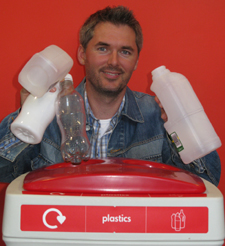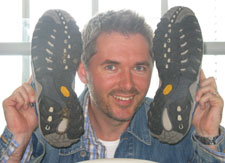Green champions and eco-refuseniks quizzed about recycling behaviour
Posted Monday 20 September 2010

As part of the project, researchers are sending questionnaires to around one in ten or 6,300 households in the Royal Borough of Kingston upon Thames. Residents will be asked a series of questions about how often they engage in eco-friendly habits such as recycling different categories of product, flattening boxes and plastic bottles before recycling, giving unwanted goods to Freegle (formerly Freecycle) or to charity, repairing broken products rather than throwing them away and buying second hand goods.
The survey is not just for eco-pioneers. The researchers are just as interested in hearing from people who cannot find the time to recycle and reuse, as well as those who do not believe it is their responsibility to sift their household waste.
Dr Steven Guilbert of Kingston's Centre for Earth and Environmental Science Research said that as the father of two young children he often felt he did not have the time to be as eco-friendly as he would like. "This isn't about being judgmental - I certainly don't have a perfect record on recycling," Dr Guilbert said. "The aim is to find out more about people's attitudes and behaviour towards the contents of their refuse bins."
The survey is part of a £200,000 three-year research project funded by the educational charity, the Leverhulme Trust, and is being conducted by Kingston University in collaboration with Exeter, Portsmouth and Northampton universities.

The survey will ask people how their recycling habits have changed over recent years and also about their attitudes to other environmental practices, such as whether they buy local produce and switch off electrical appliances and lights when not in use.
"What sets our survey apart from others is that as well as finding out what people do with their household waste and why, we want to contextualise it by finding out how it relates to lifestyle and how behaviour changes over a lifetime," Dr Guilbert explained. "In your 20s when you have more time and less money you may be good at recycling. When you have children it makes you more conscious of the environment but there are more constraints on your time. And when you're older you may be less aware of modern practices or may have physical limitations that make it difficult to recycle or take unwanted goods to the tip." This kind of information about how habits changed over a lifetime could help authorities and others target recycling advice and enable them to help people who may struggle to recycle, said Dr Guilbert.
The organisers emphasise that responses are confidential, so no one need feel guilty if they fail to recycle every bottle and teabag. The survey itself is a 16 page tick-box questionnaire that can be completed online or by returning it in a pre-paid envelope. Everyone who completes a questionnaire will be entered into a draw with three prizes - a £50 John Lewis voucher, a deluxe eco-hamper or a meal for two at Jamie's Italian. The paper questionnaires will, of course, be recycled.